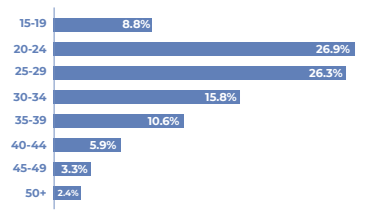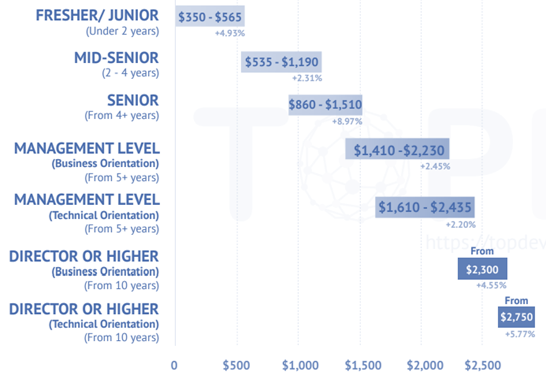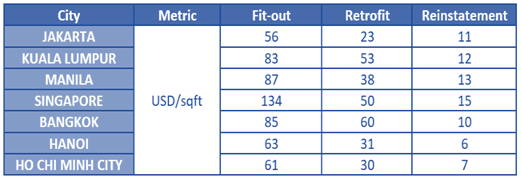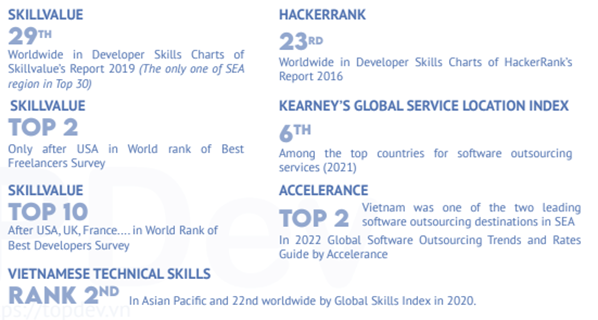As a tech company executive, you're always on the lookout for new opportunities to leverage talent and resources. Your goal is to find the right combination of technical skills, low costs, and scalability to drive innovation and gain a competitive advantage. For too long, your search has been limited to the usual suspects: India, China, and Eastern Europe. But there's an emerging opportunity in Southeast Asia you can no longer afford to ignore.
Vietnam has a young, growing population, strong technical universities, and a low cost of living. Tech giants like Samsung, Intel, and Microsoft have already set up research centers and offices there, taking advantage of a skilled workforce at nearly half the cost of China or India. If you're looking to expand into new markets, reduce costs, and tap into a talent pool of motivated, tech-savvy workers, it's time to consider Vietnam.
A Young, Tech-Savvy Population
Vietnam’s youth are poised to propel the country to become a leading tech hub. With over 60% of Vietnam’s IT human resources under 35 years old, the country has a young, digitally fluent workforce.

Vietnam Developers by Age Group (Source: Vietnam IT Market Report 2020 by TopDev)
- Vietnam has the fastest-growing middle class in Southeast Asia. Higher incomes and greater connectivity mean more Vietnamese have access to technology and the skills to leverage it. According to the Ministry of Information and Communications, over 73.2% of the Vietnamese population use the Internet daily, and by March 2022, there were 93.5 million smartphone subscribers, reaching 73.5% of the country’s adults.
- Vietnam’s education system emphasizes science, technology, engineering, and math (STEM) fields. Vietnamese students consistently rank near the top of global assessments in math and science. This foundation in technical skills prepares youth for careers in the digital economy.
STEM fields

- The Vietnamese government has prioritized developing a knowledge-based economy. Policymakers have invested heavily in digital infrastructure, skills training programs, and incentives for tech companies. These initiatives are creating opportunities for youth to pursue tech jobs.
- Major tech companies are taking notice of Vietnam’s talent pool. Google, Microsoft, IBM, and others have offices in Vietnam and partner with local universities on training programs. As more global tech companies enter Vietnam, high-skilled job opportunities for youth will grow.

Launching ceremony organized by the Ministry of Planning and Investment, Google and the Vietnam Innovation Center (VNIC) at the "Grow together for a better future" event in Hanoi (Source: Phi Nhat)
Vietnam’s youth are well-positioned to drive innovation, and global tech companies would be remiss not to tap into this valuable resource. With a tech-savvy population, robust digital infrastructure, and government support, Vietnam has cultivated the ideal conditions for youth to thrive in the digital economy. The future is bright for Vietnam’s tech sector, and its youth are ready to lead the way.
Low Labor and Operating Costs
Vietnam offers businesses low labor and operating costs that make it an attractive hub for technology companies looking to outsource work or set up research and development centers.
- Labor costs in Vietnam are significantly lower than in other parts of Asia. According to Glassdoor, the average annual salary for a Vietnam software engineer is just over $10,000 USD, compared to $40,000 USD in China. This results in major cost savings, especially for companies hiring hundreds of engineers.

Vietnam Developer salary by years of experience [Unit: USD] Note: Monthly gross salary before tax and excludes other benefits like overtime, bonus, etc (Source: Vietnam IT Market Report. Tech Hiring 2022 by TopDev)
- Office space and utilities are also very affordable in Vietnam. Rent for commercial office space in major tech hubs like Ho Chi Minh City and Hanoi is a fraction of the cost of space in neighboring countries. This reduces overhead and allows companies to spend more on hiring top talent.

Average office fit-out costs in major Southeast Asian cities (Source: Cushman Wakefield’s Asis Pacific Office Fit-out Cost Guide 2022 Report)
- The Vietnamese government offers tax incentives and breaks for tech companies. High-tech firms setting up operations in Vietnam can take advantage of corporate tax holidays, tax reductions, and exemptions on imported materials and equipment. These incentives make Vietnam's already low costs even more competitive. (Click for more details)
- A large pool of university-educated, multilingual workers provides companies with a range of skilled candidates. Vietnam's youth are adept at English and major tech skills like coding, web development, and UX design. This combination of low costs and high skills is attracting major companies to invest in Vietnam.

Summary of Vietnamese Developers’ competency (Source: Vietnam IT Market Report. Tech Hiring 2022 by TopDev)
Between affordable labor and operating costs, government incentives, and a skilled workforce, Vietnam offers an ideal environment for technology companies looking to establish a presence in Asia at a lower cost. With such a compelling value proposition, Vietnam is poised to become a leading tech hub in the region.
A Growing Number of Startup Success Stories
Vietnam’s tech startup scene is gaining global attention, with a growing number of success stories attracting interest from investors around the world.
According to Vietcetera, Vietnam has replaced the Philippines in the list of Southeast Asia's "Best Countries for Startups in 2022" published by StartupBlink, a global startup ecosystem and research center. If this upward trend continues, Vietnam will likely surpass Thailand by the end of the year.
Major Exits and Funding Rounds
Some of the country’s most well-known startups have achieved major exits or funding rounds recently. In 2019, e-wallet company Momo raised over $100 million in a funding round led by Warburg Pincus.

Fintech app Momo is the latest unicorn startup in Vietnam (Source: Momo)
Increasing Interest from Global Investors
As Vietnam’s startup ecosystem has matured, it has attracted more foreign venture capital. Over 3,800 firms have invested billions of dollars in Vietnam, making it one of the startup ecosystems with the fastest growth in the area. Vietnam isn't just a rising star; it's a force to be reckoned with as a new generation of entrepreneurs disrupts the established corporate environment.
A Deep Tech Focus
While Vietnam’s startup scene began with e-commerce, fintech, and travel tech companies, it is now developing strengths in sectors like AI, blockchain, and logistics tech. Startups like Rockship is applying new technologies to solve problems in various industries.
Vietnam’s growing number of startup success stories demonstrate the country’s potential to become a hub for digital innovation in Southeast Asia. In fact, Vietnam’s digital economy has seen significant growth over the last decade and is expected to be valued at US$57 billion by 2025.
With a huge market, government support, and access to global capital and networks, Vietnam’s tech startups are poised for major growth in the coming years. Investors worldwide would do well to keep a close eye on Vietnam.
Conclusion
As you have seen, Vietnam offers an unparalleled combination of low costs and high skills that position it to become Asia's next major tech hub. The country has invested heavily in education and workforce training to build a pipeline of engineering talent to meet the needs of global tech companies. With competitive salaries, operational costs up to 60% lower than in Silicon Valley, and an emerging startup scene, Vietnam deserves your attention and investment. The future is being built in Vietnam, and companies that establish an early presence will benefit from first-mover advantage. Don't get left behind - the time to invest in Vietnam is now. Vietnam's tech sector is ready to take off, and you have the opportunity to go along for the ride. The next startup or engineering hub for your company could very well be in the heart of Asia.
Vietnam is ready for you - are you ready for Vietnam?
Follow Rockship Blogs and RocketBuilder Newsletter for more posts about software craftsmanship like this.



